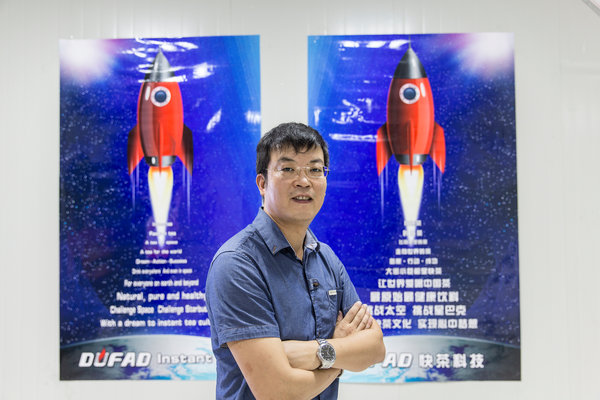The deadly crash of Virgin Galactic’s SpaceShipTwo in California may be raising concerns in the United States over the safety of space tourism, but so far it does not seem to have dampened the enthusiasm of would-be astronauts in China.
上周五维珍银河(Virgin Galactic)太空船二号(SpaceShipTwo)在加利福尼亚坠毁。这次致死事故或许正在美国各地引发人们对太空旅游的安全担忧。然而在中国,对于那些未来的宇航员来说,这似乎迄今为止还没有打消他们的热情。
“Even if my body doesn’t work, my mind will always be determined to go into space,” said Sheng Tianxing, a 41-year-old tea trader from the southeastern province of Zhejiang. In June, he put down $100,000 to reserve a seat on a rocket that promises to carry him into space for about six minutes in 2016.

“就算我的身体吃不消了,我的大脑一定还是想上太空的,”41岁来自中国东南省份浙江的茶商盛天行说。今年6月,盛天行花10万美元为自己定下了一个座,将在2016年搭乘太空飞船,在100公里以上的太空停留约6分钟。
“I haven’t thought about the money issue at all. Anything can go wrong. If you worry about this, you’ll just have too many things to worry about,” said Mr. Sheng, who had just returned from a holiday in France.
“我还根本没有考虑钱的问题。如果你担心这个,那你就担心不完了,”刚刚从法国度假回国的盛天行说。
Dexo Travel, a Beijing-based sales agent that sells space trips operated by XCOR Aerospace, Virgin Galactic’s only competitor in offering civilian suborbital space journeys, said that none of its clients had called to cancel a space flight since the crash last Friday, which killed one pilot and seriously injured another.
为XCOR Aerospace公司代理中国地区太空游票务的探索旅行公司称,上周五坠毁事故发生,导致一死一重伤,至今还没有一位客户打电话要求退票。XCOR Aerospace和维珍银河是目前世界上仅有的两家提供亚轨道平民太空游的公司。
Wang Luye, a travel agent at Dexo, said the company was continuing to receive inquiries about flights “as if nothing happened.”
探索旅行公司的代理王陆叶说,公司还是每天会接到电话咨询太空游,“就好像什么事都没发生过”。
(Virgin Galactic is barred by United States regulations from selling tickets to citizens of China and 21 other countries because its spacecraft are powered by rocket engines manufactured in the United States, using technology considered to have potential military applications.)
(根据美国相关法规,维珍银河不得向包括中国在内的22个国家的公民售票。原因是维珍银河的太空飞船使用了在美国生产的火箭发动机,而这种发动机使用的技术可能用于军事。)
XCOR has sold 34 tickets for commercially operated space flights in China since it began offering them in the country late last year. That represents about one-tenth of all the bookings the company has received since it started taking orders in 2011. XCOR’s first flight carrying space tourists is expected to take off in late 2015.
自从去年底开始在中国售票,XCOR的商业太空游已售出了34张票。对于从2011年开始售票的XCOR公司来说,这大概占了它预定总量的十分之一。按照计划,XCOR第一艘搭载游客的太空飞船将于2015年年底起飞。
Zhang Yong, chief executive of Dexo Travel, has predicted that China, with its growing wealth, is set to become the largest market for space tourism.
探索旅行公司的总裁张勇预计,随着财富的增加,中国在未来将成为全球最大的太空游市场。
Zhang Xiaoyu, a 29-year-old entrepreneur in Beijing who has booked a space flight for next year, said he compared the trips offered by Virgin Galactic and XCOR before he signed the contract, and was confident of the safety of the vehicle that will carry him aloft.
北京29岁的创业者张潇雨已经预定了明年飞太空的船票,他说他在签订合同之前就比较过维珍银河的太空游和XCOR的太空游,他相信飞船的安全性。
“They use different technologies,” said Mr. Zhang, whose dream is to see Earth from space by the time he is 30.
“两家公司用的技术完全不同,”张潇雨说。他的梦想是能在30岁的时候从太空回望地球。
XCOR’s chief executive, Jeff Greason, said in a statement Monday that XCOR’s Lynx is “a very different vehicle” from the SpaceShipTwo that crashed. He promised, though, that XCOR would continue to test and retest the vehicle and its systems.
XCOR首席执行官杰夫·格里森(Jeff Greason)在周一的一份声明中表示,XCOR的“山猫(Lynx)”号太空飞船与坠毁的太空船二号是“非常不同的飞船”。但他承诺,XCOR将继续对飞船及其系统进行测试、再测试。
In comments on social media, some Chinese reacted to the Virgin Galactic crash as an occasion to complain about the company’s exclusion of Chinese citizens from space flights and to praise China’s own accomplishments.
在社交媒体上,一些中国人在谈及维珍银河飞船的坠毁时,借机抱怨这家公司拒绝为中国公民提供太空游,同时赞美中国在航天领域的成就。
A commenter using the name Hanhaihuangsha wrote on the microblog site Sina Weibo: “The company allows anyone who pays to board its spaceship, except for Chinese.”
在新浪微博上,一位名叫“瀚海黄沙”的用户写道,“这间公司前不久宣布,除中国人以外,全世界人民都可以买票上太空玩。”
Wangkang16 wrote: “China has the most reliable space technology, which is achieved by a huge amount of money.”
王康16写道,“中国太空技术全球最可靠,可能真是钱烧出来的。”
Meanwhile, some Chinese are intent on developing a homegrown space program for civilian use, including tourism.
与此同时,一些中国人开始一心研发本土的民用太空项目,包括太空旅游。
“No matter how China is progressing in space, I have always had a personal interest in it,” said Hu Zhenyu, 21, a recent graduate of South China University of Technology in Guangzhou.
“不管国家在航天领域发展如何,我自己一直都是很感兴趣,”今年毕业于广州华南理工大学的胡振宇说。
Earlier this year, Mr. Hu registered China’s first private rocket company, Link Space. His immediate plan is to develop rockets for scientific research, and he hopes to launch an unmanned rocket within a year. In the long term, he said, he hopes to have the technology to carry tourists into space.
今年年初,胡振宇注册成立了中国第一家航天系统产品研发制造的私营公司翎客航天。他近期的目标是开发用于科研的火箭,计划能在一年内发射无人火箭。他表示,从长远来说希望能开发出送游客遨游太空的技术。
Fu Song, a professor at the School of Aerospace Engineering at Tsinghua University in Beijing, said that recent successes in China’s government space program had kindled interest in the wider possibilities of space travel.
清华大学航天航空学院教授符松表示,中国政府近年来在航天领域屡屡成功,引发了人们对飞太空的更大信心和兴趣。
“When Armstrong walked on the moon, it was a first for mankind,” Mr. Fu said. “Now everyone knows you can go to space. It’s just a question of whether you want to go.”
“阿姆斯特朗登月是人类的第一次,”符松说,“现在大家都知道你可以飞太空,只是愿不愿意去的问题。”













